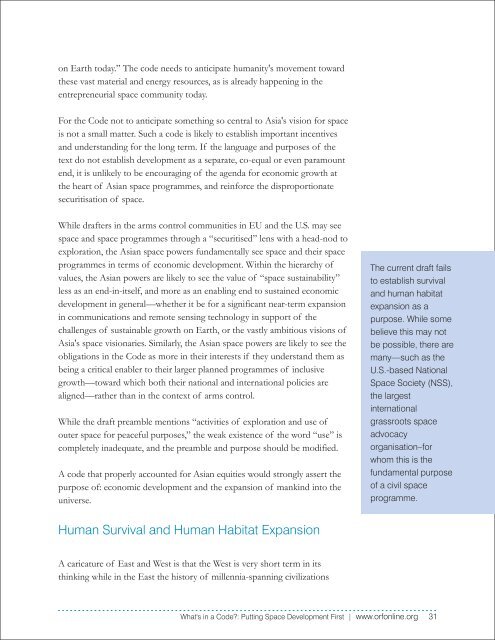AwaitingLaunch_1397728623369
AwaitingLaunch_1397728623369
AwaitingLaunch_1397728623369
Create successful ePaper yourself
Turn your PDF publications into a flip-book with our unique Google optimized e-Paper software.
on Earth today.” The code needs to anticipate humanity's movement toward<br />
these vast material and energy resources, as is already happening in the<br />
entrepreneurial space community today.<br />
For the Code not to anticipate something so central to Asia's vision for space<br />
is not a small matter. Such a code is likely to establish important incentives<br />
and understanding for the long term. If the language and purposes of the<br />
text do not establish development as a separate, co-equal or even paramount<br />
end, it is unlikely to be encouraging of the agenda for economic growth at<br />
the heart of Asian space programmes, and reinforce the disproportionate<br />
securitisation of space.<br />
While drafters in the arms control communities in EU and the U.S. may see<br />
space and space programmes through a “securitised” lens with a head-nod to<br />
exploration, the Asian space powers fundamentally see space and their space<br />
programmes in terms of economic development. Within the hierarchy of<br />
values, the Asian powers are likely to see the value of “space sustainability”<br />
less as an end-in-itself, and more as an enabling end to sustained economic<br />
development in general—whether it be for a significant near-term expansion<br />
in communications and remote sensing technology in support of the<br />
challenges of sustainable growth on Earth, or the vastly ambitious visions of<br />
Asia's space visionaries. Similarly, the Asian space powers are likely to see the<br />
obligations in the Code as more in their interests if they understand them as<br />
being a critical enabler to their larger planned programmes of inclusive<br />
growth—toward which both their national and international policies are<br />
aligned—rather than in the context of arms control.<br />
While the draft preamble mentions “activities of exploration and use of<br />
outer space for peaceful purposes,” the weak existence of the word “use” is<br />
completely inadequate, and the preamble and purpose should be modified.<br />
A code that properly accounted for Asian equities would strongly assert the<br />
purpose of: economic development and the expansion of mankind into the<br />
universe.<br />
The current draft fails<br />
to establish survival<br />
and human habitat<br />
expansion as a<br />
purpose. While some<br />
believe this may not<br />
be possible, there are<br />
many—such as the<br />
U.S.-based National<br />
Space Society (NSS),<br />
the largest<br />
international<br />
grassroots space<br />
advocacy<br />
organisation–for<br />
whom this is the<br />
fundamental purpose<br />
of a civil space<br />
programme.<br />
Human Survival and Human Habitat Expansion<br />
A caricature of East and West is that the West is very short term in its<br />
thinking while in the East the history of millennia-spanning civilizations<br />
What's in a Code?: Putting Space Development First | www.orfonline.org 31








